01 - Empowering Political Executive: Analysing Government-Opposition Relations Amidst...
http://dx.doi.org/10.31703/gpr.2019(IV-IV).0110.31703/gpr.2019(IV-IV).01 Published : Dec 2019
-
The era of Zulfikar Ali Bhutto is characterized by sensational and dramatic political developments. As the post-1972 developments revealed, Bhuttos style of politics was quite different from what he had been projecting ever since 1967. The PPP was lacking the collaborative working mechanism. The opposition leaders sensed undemocratic treatment all the time. The PPP victory in the firstever general... Details
-
Constitutional Development, Amendments, Parliamentary System, Provincial Autonomy and Opposition.
-
(1) Arif Khan
Assistant Professor,Department of Political Science,University of Buner, Swari, KP, Pakistan.
(2) Bakhtiar Khan
Assistant Professor,Department of Political Science,University of Buner, Swari, KP, Pakistan.
(3) Saif Ul Islam
Assistant Professor, Department of Political Science,University of Buner, KP, Pakistan.
02 - Relationship between Consumption of TV Political Programs and Media Malaise in S...
http://dx.doi.org/10.31703/gpr.2019(IV-IV).0210.31703/gpr.2019(IV-IV).02 Published : Dec 2019
-
This study explores the relationship between consuming Pakistani TV political programs and media malaise to shape external efficacy among University students of Lahore. This study assumed that entrainment and talk shows make students cynical, distrustful and pessimistic; commonly known as media malaise which causes them to affect their external efficacy. Media malaise has been measured with two in... Details
-
Cynicism, External Political Efficacy, Media Malaise, Political Participation.
-
(1) Amber Mubeen
PhD Scholar, Institute of Communication Studies,University of The Punjab, Lahore, Punjab, Pakistan.
(2) Noshina Saleem
Professor,Institute of Communication Studies, University of The Punjab, Lahore, Punjab, Pakistan.
(3) Faiza Latif
Assistant Professor,Department of Mass Communication, Lahore College for Women University, Lahore, Punjab, Pakistan.
03 - History of Coalitions in Pakistan (1947 To 1973) and the Factors Shaping it...
http://dx.doi.org/10.31703/gpr.2019(IV-IV).0310.31703/gpr.2019(IV-IV).03 Published : Dec 2019
-
A political alliance is a temporary combination of groups or individuals formed to pursue specific objectives through joint action. Pluralist democracies are characterized by alliances and coalitions by diverse political parties. Political parties, desiring to exercise powers in democracies having parliamentary setups, naturally have to come in coalition with the major political party in parliamen... Details
-
Coalition, Dictatorship, Pluralism, Parliamentary democracy, Alliance, Politics.
-
(1) Muhammad Qasim
PhD Scholar, Department of Political Science, University of Peshawar, Peshawar, KP, Pakistan.
(2) Ahmad Ali
Lecturer, Department of Higher Education Peshawar,KP, Pakistan.
04 - Interactive Effect of Perceived Organizational Politics and Hierarchical Status ...
http://dx.doi.org/10.31703/gpr.2019(IV-IV).0410.31703/gpr.2019(IV-IV).04 Published : Dec 2019
-
Drawing upon deviant place theory, we examined the role of organizational politics in workplace victimization considering the moderating effect of employees hierarchical status in the context of higher educational institutions in Pakistan. Data was collected from 313 employees holding various positions in the teaching faculty of selected universities in Lahore. The survey instrument consisted of e... Details
-
Organizational politics, employee status, workplace victimization
-
(1) Amna Gul
Student,Department of Business Administration,Virtual University of Pakistan, Lahore, Punjab, Pakistan.
(2) Farooq Ahmad
Assistant Professor, Faculty of Management Science, SZABIST, Larkana, Sindh, Pakistan.
(3) Shahida Mariam
Librarian,Department of Business & Commerce,Government Institute of Commerce, Rawalpindi, Punjab, Pakistan.
05 - Reimagining the Populism and Leadership of Miss Fatima Jinnah...
http://dx.doi.org/10.31703/gpr.2019(IV-IV).0510.31703/gpr.2019(IV-IV).05 Published : Dec 2019
-
This article explores dynamics of Miss Fatima Jinnah’s leadership qualities by applying the Ideational approach. The article aims to re-think the scenario of Pakistan at the eve of presidential elections 1965 with regarding populism. It underscores causes, events and consequences of the 1965’s Elections by re-contextualizing the views and actions of Miss Jinnah. She won the elections, ... Details
-
Populism, Ideational Approach, Leadership, Miss Fatima Jinnah, Presidential Elections
-
(1) Sana Zaheer
PhD Scholar, Department of History and Pakistan Studies, University of the Punjab, Lahore, Punjab, Pakistan.
(2) Muhammad Iqbal Chawla
Professor (Former Dean of arts and Former Chairman), Department of History, University of the Punjab, Lahore, Punjab, Pakistan.
06 - Prospects for Pak-China Relations ...
http://dx.doi.org/10.31703/gpr.2019(IV-IV).0610.31703/gpr.2019(IV-IV).06 Published : Dec 2019
-
South Asia is in focus of global geopolitics since the advent of the 21st century. China is an economic giant and outreaching towards West through Belt and Road Initiative (BRI). CPEC (part of BRI) has brought Pakistan in streamline in regional geopolitics. United States (US) is worried about Chinas rise, for its national interests are in danger in Asia so, it perused Pivot to Asia strategy to cou... Details
-
Pak-China counterterrorism narrative, Enhancing economic relations through CPEC, Instability and conflict in Pakistan-Afghan region, Indo-US growing strategic ties.
-
(1)
(3) Faiqa Mushtaq
Head Mistress, Department of International Relations, University of Peshawar, KP, Pakistan.
07 - BRICS and African Region Partnership: Challenges and Opportunities...
http://dx.doi.org/10.31703/gpr.2019(IV-IV).0710.31703/gpr.2019(IV-IV).07 Published : Dec 2019
-
BRICS (Brazil, Russia, India, China and South Africa) has amplified its regional and global impact. The economic success of BRICS is a motivation to Africa because BRICS and African region have a similar historical background. The partnership between Africa and the BRICS has extended fresh drive and created ample interest in last decades because BRICS is playing an important role in international ... Details
-
BRICS, Global Governance, Regionalism, WTO, United Nations, African Region, Africa
-
(1) Muhammad Atif
Phd Scholar, Institute of Social Sciences, Bahauddin Zakariya University, Multan, Punjab, Pakistan.
(2) Muqarrab Akbar
Professor/Chairman, Department of Political Science, Bahauddin Zakariya University, Multan, Punjab, Pakistan.
08 - Pakistans Security Dilemma with Afghanistan and India...
http://dx.doi.org/10.31703/gpr.2019(IV-IV).0810.31703/gpr.2019(IV-IV).08 Published : Dec 2019
-
Security dilemma plays an important part in determining state relations when particularly they are next door neighbors. In such a condition, it becomes difficult for the states to keep their security protected. Nations have to adopt policies that are beneficial for their national interest. An important function of security dilemma is that it also supports the balance of power theory which helps in... Details
-
Security Dilemma, India, Afghanistan, Border
-
(1) Muhammad Tariq
Teacher, Elementary and Secondary Education Department, Mardan, KP, Pakistan.
(2) Arif Khan
Assistant Professor, Department of Political Science, University of Buner (Swari), KP, Pakistan.
(3) Bakhtiar Khan
Assistant Professor, Department of Political Science, University of Buner (Swari), KP, Pakistan.
09 - News Values on Social Media and use of Twitter...
http://dx.doi.org/10.31703/gpr.2019(IV-IV).0910.31703/gpr.2019(IV-IV).09 Published : Dec 2019
-
The deceptively simple question remains unquestioned as "what news values are there particularly for social media?" As we implement the future of News writing in the hand of digital age, news values need to be identified and questioned. This article examines the main features of news values of social media specifically of Twitter which is no doubt the rapid source of news dissemination. This study... Details
-
News values, Social Media, Twitter, and Newsworthiness.
-
(1) Zahid Yousaf
Associate Professor, Centre for Media and Communication Studies, University of Gujrat, Punjab, Pakistan.
(2) Rooh ul Amin Khan
Assistant Professor, Media and Communication Studies, International Islamic University, Islamabad, Pakistan.
(3) Malik Adnan
Assistant Professor, Department of Media Studies, The Islamia University Bahawalpur, Punjab, Pakistan.
10 - CPEC a Gateway: Changing the Lives of Intra and Inter-Regional People...
http://dx.doi.org/10.31703/gpr.2019(IV-IV).1010.31703/gpr.2019(IV-IV).10 Published : Dec 2019
-
CPEC is an ongoing development megaproject which aims to connect Gwadar Port of Pakistan to Chinas northwestern region of Xinjiang, via a network of highways, railways, and pipelines. The economic corridor is considered central to China-Pakistan relations and will run about 2700 km from Gwadar to Kashgar. The vision and mission of CPEC are "To improve the lives of people of Pakistan and China". By... Details
-
CPEC, Pakistan, China, People.
-
(1) Ujala Siddiq
Lecturer, Faculty of Contemporary Studies, National Defence University, Islamabad, Pakistan.
(2) Zargham Ullah Khan
Assistant Professor, Hailey College of Banking and Finance, University of Punjab, Lahore, Punjab, Pakistan.
(3) Aisha Tahir
MPhil, Junior Regional Manager SMEDA.
11 - Russia, United States and China in South Asian Politics: Implications for Pakist...
http://dx.doi.org/10.31703/gpr.2019(IV-IV).1110.31703/gpr.2019(IV-IV).11 Published : Dec 2019
-
End of the Cold War caused a paradigm shift in world politics by converting the bipolar world into a unipolar world with the emergence of the USA as a sole superpower in the field of international politics. Indo-US obnoxious nexus has put the security situation in perils in South Asia. America is in a full endeavor to contain China to halt her everexpanding sphere of influence. Positive and proact... Details
-
India, IOR, Geo-Politics, Pakistan, Russia
-
(1) Iftikhar Ahmad
PhD Scholar, Department of Political Science and International Relations, University of Gujrat, Punjab, Pakistan.
(2) Ramzan Shahid
Assistant Professor, Department of Political Science and International Relations, University of Gujrat, Punjab, Pakistan.
12 - Executive Assaults on Supreme Court of Pakistan and Movement for Independent Jud...
http://dx.doi.org/10.31703/gpr.2019(IV-IV).1210.31703/gpr.2019(IV-IV).12 Published : Dec 2019
-
Pakistan, since independence, has become a laboratory for constitutional experiments, with the judiciary playing the most controversial role. Under the theory of necessity, the superior judiciary has legalized military takeovers. Although controversial as a judge of the Supreme Court of Pakistan, Iftekhar Muhammad Chaudhry was found to be a changed person the moment he took his seat as a Chief Jus... Details
-
Judiciary, Supreme Court, Chief Justice of Pakistan, Rule of Law, Army
-
(1) Hina Malik
Demonstrator, Department of Political Science, Abdul Wali Khan University Mardan, KP, Pakistan.
(2) Sana Ullah
Demonstrator, Department of Political Science, Abdul Wali Khan University Mardan, KP, Pakistan.
(3) Ayaz Ali Shah
Lecturer, Department of Political Science, Abdul Wali Khan University Mardan, KP, Pakistan.
13 - Representation of the Orient: A Postcolonial Perspective on Robert Greene's Seli...
http://dx.doi.org/10.31703/gpr.2019(IV-IV).1310.31703/gpr.2019(IV-IV).13 Published : Dec 2019
-
Amidst a variety of cultural cum representational notions of individual or group identity, postcolonial studies attempt not only to explore and unfold how Eurocentric logos builds social realities but employs ways also to deconstruct the stereotypes. It provides theorists and critics with analytical methods to see how a fictional work supports or subverts a common paradigm based on Eurocentrism. T... Details
-
Selimus, Orientalism, Oriental Discourse, Ottoman Turks, Occident/Orient Binary
-
(1) Muhammad Imran
Assistant Professor, Department of English, Government College Havelian KP, Pakistan.
(2) Nazakat
Lecturer, Department of English, Hazara University Mansehra, KP, Pakistan.
(3) Adil Khan
Lecturer, Department of Pakistan Studies, Hazara University, Mansehra, KP, Pakistan.
14 - An Appraisal of the Transgender (Protection of Rights) Act, 2018 in the Light of...
http://dx.doi.org/10.31703/gpr.2019(IV-IV).1410.31703/gpr.2019(IV-IV).14 Published : Dec 2019
-
In Pakistan, a bill was passed in 2018 under the pretext of safeguarding the rights of transgender persons. Since its enactment, it stirred controversy and remains a subject of debate to this day in terms of its corresponding consistency with Shariah (Islamic Law). However, dueto a lack of proper understanding, the confusion is not just limited to ordinary citizens but is widespread among highly e... Details
-
The Transgender (Protection of Rights) Act 2018, Rights of the Transgender, Gender Identity, Mukhanas, Constitution of Islamic Republic of Pakistan 1973
-
(1) Muhammad Siraj Khan
Nawab Allah Nawaz Khan Law College, Gomal University, Dera Ismail Khan, KP, Pakistan.
(2) Raza Ullah Shah
Department of Management Sciences, Qurtuba University, Dera Ismail Khan, KP, Pakistan.
(3) Naghma Farid
Nawab Allah Nawaz Khan Law College, Gomal University, Dera Ismail Khan, KP, Pakistan.

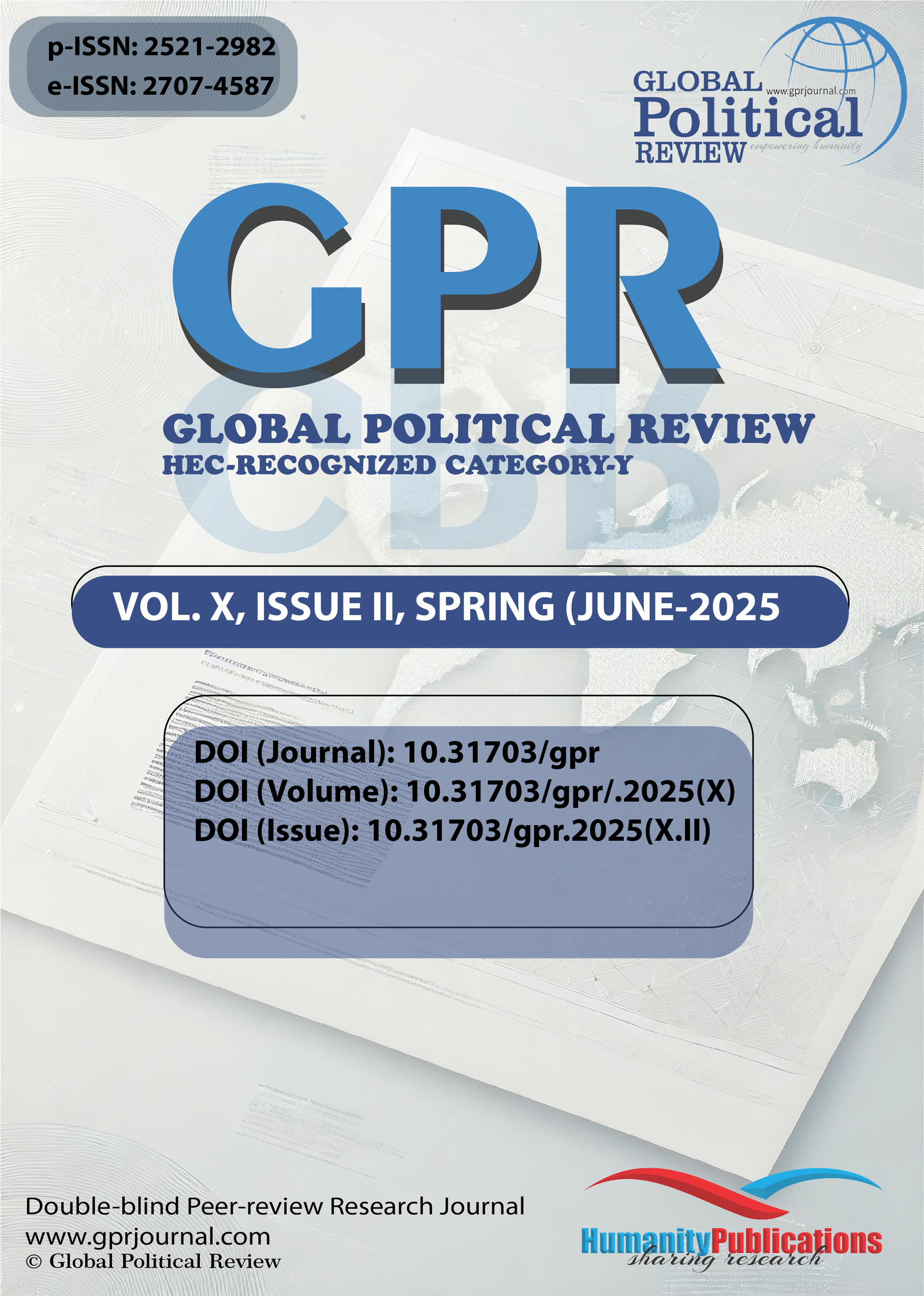 Volume X, Issue II (Spring 2025)
Volume X, Issue II (Spring 2025)  Volume X, Issue I (Winter 2025)
Volume X, Issue I (Winter 2025)  Volume IX, Issue IV (Fall 2024)
Volume IX, Issue IV (Fall 2024)  Volume IX, Issue III (Summer 2024)
Volume IX, Issue III (Summer 2024)  Volume IX, Issue II (Spring 2024)
Volume IX, Issue II (Spring 2024)  Volume IX, Issue I (Winter 2024)
Volume IX, Issue I (Winter 2024) 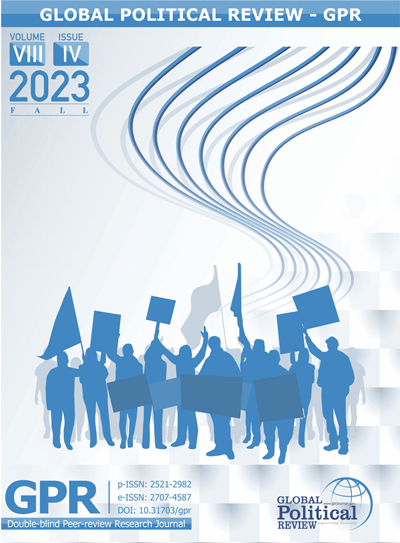 Volume VIII, Issue IV (Fall 2023)
Volume VIII, Issue IV (Fall 2023)  Volume VIII, Issue III (Summer 2023)
Volume VIII, Issue III (Summer 2023)  Volume VIII, Issue II (Spring 2023)
Volume VIII, Issue II (Spring 2023) 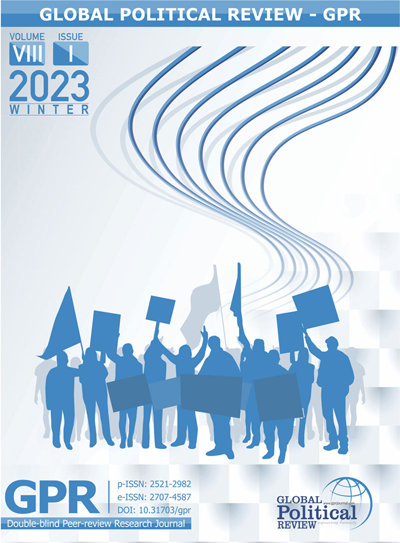 Volume VIII, Issue I (Winter 2023)
Volume VIII, Issue I (Winter 2023) 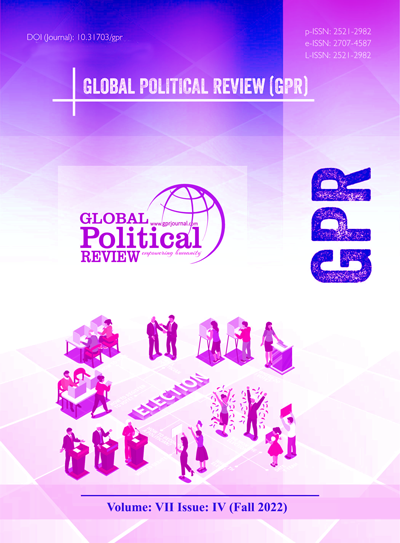 Volume VII, Issue IV (Fall 2022)
Volume VII, Issue IV (Fall 2022)  Volume VII, Issue III (Summer 2022)
Volume VII, Issue III (Summer 2022)  Volume VII, Issue II (Spring 2022)
Volume VII, Issue II (Spring 2022)  Volume VII, Issue I (Winter 2022)
Volume VII, Issue I (Winter 2022) 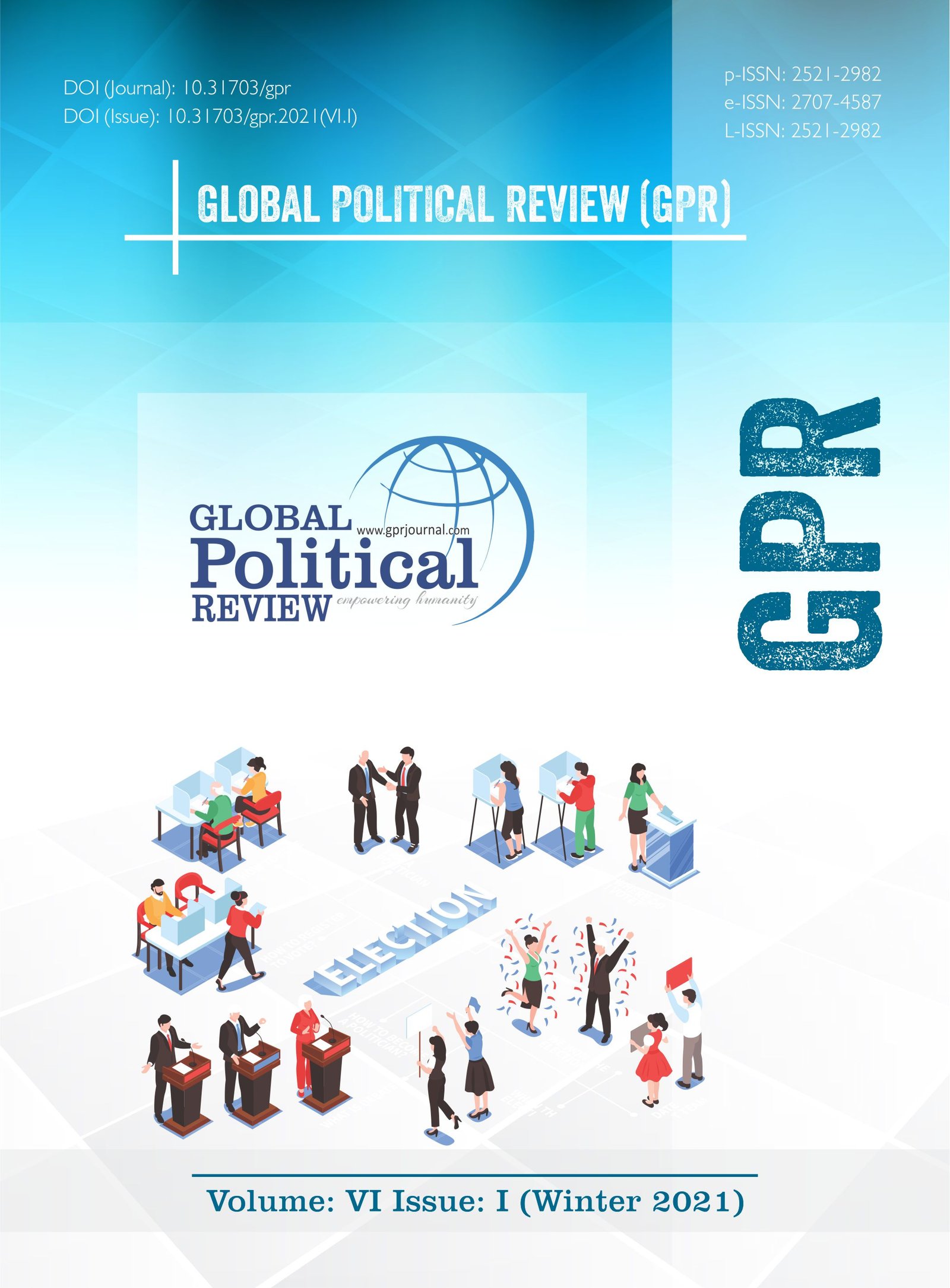 Volume VI, Issue IV (Fall 2021)
Volume VI, Issue IV (Fall 2021) 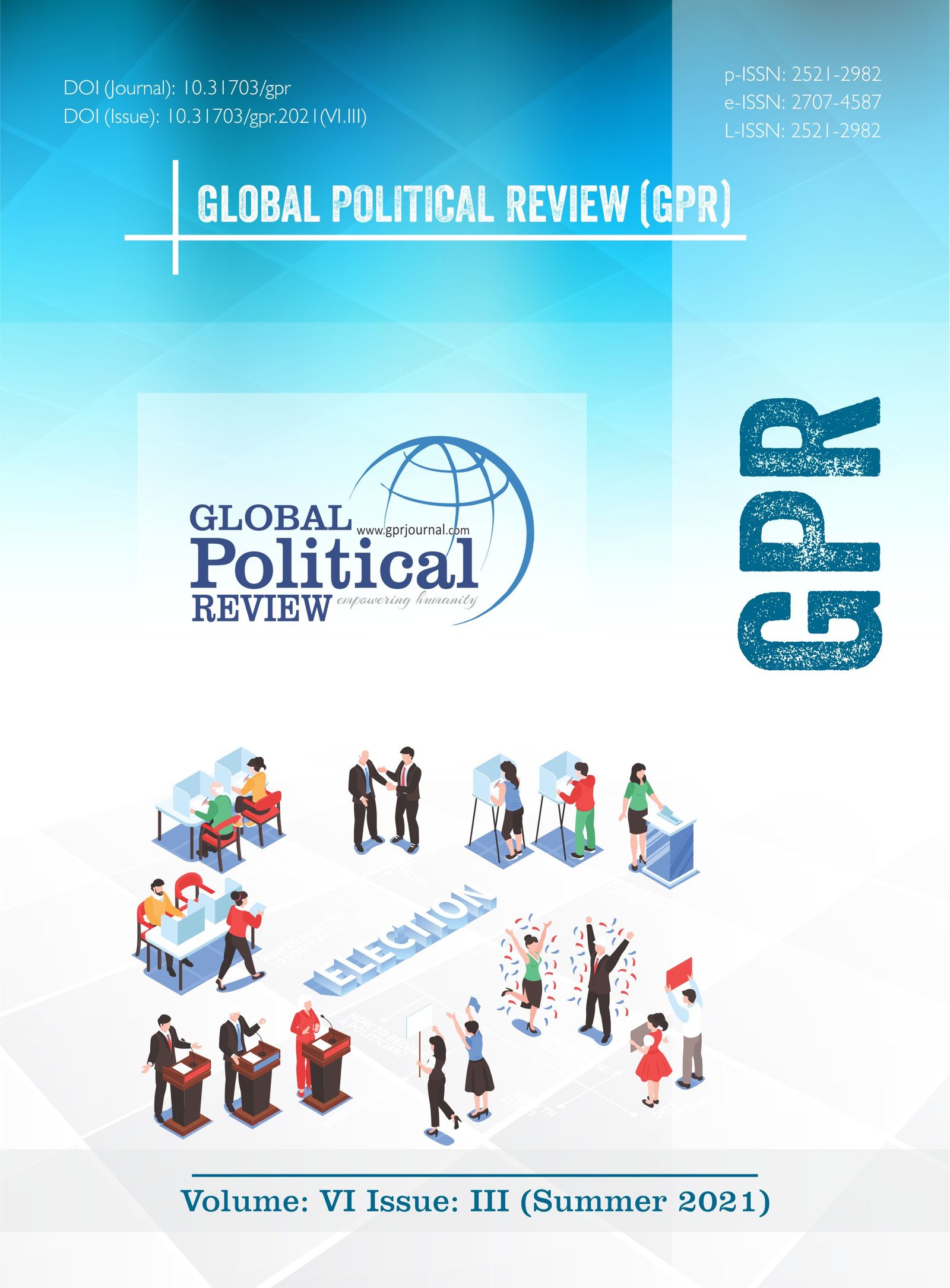 Volume VI, Issue III (Summer 2021)
Volume VI, Issue III (Summer 2021)  Volume VI, Issue II (Spring 2021)
Volume VI, Issue II (Spring 2021) 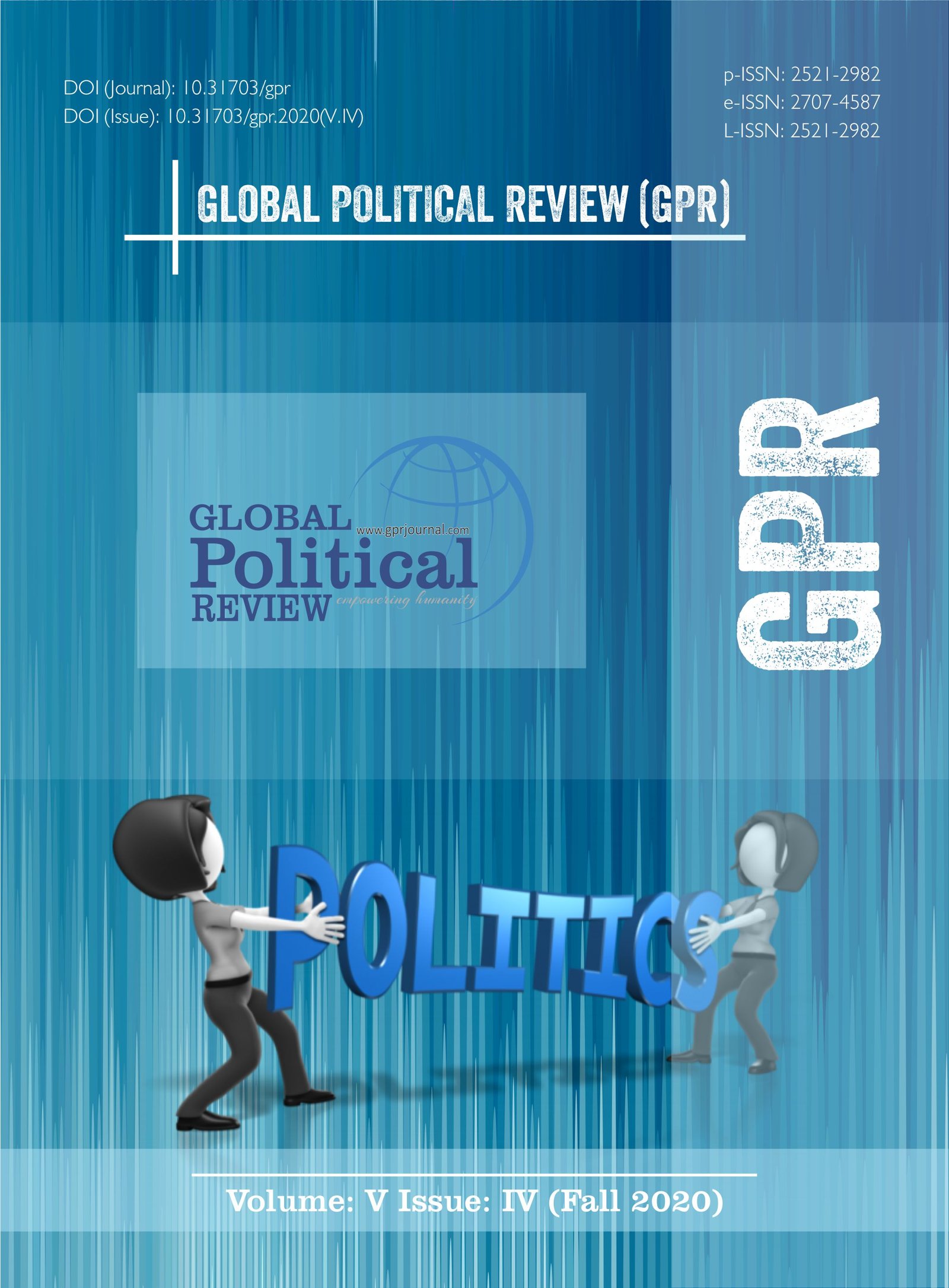 Volume V, Issue IV (Fall 2020)
Volume V, Issue IV (Fall 2020)  Volume V, Issue III (Summer 2020)
Volume V, Issue III (Summer 2020) 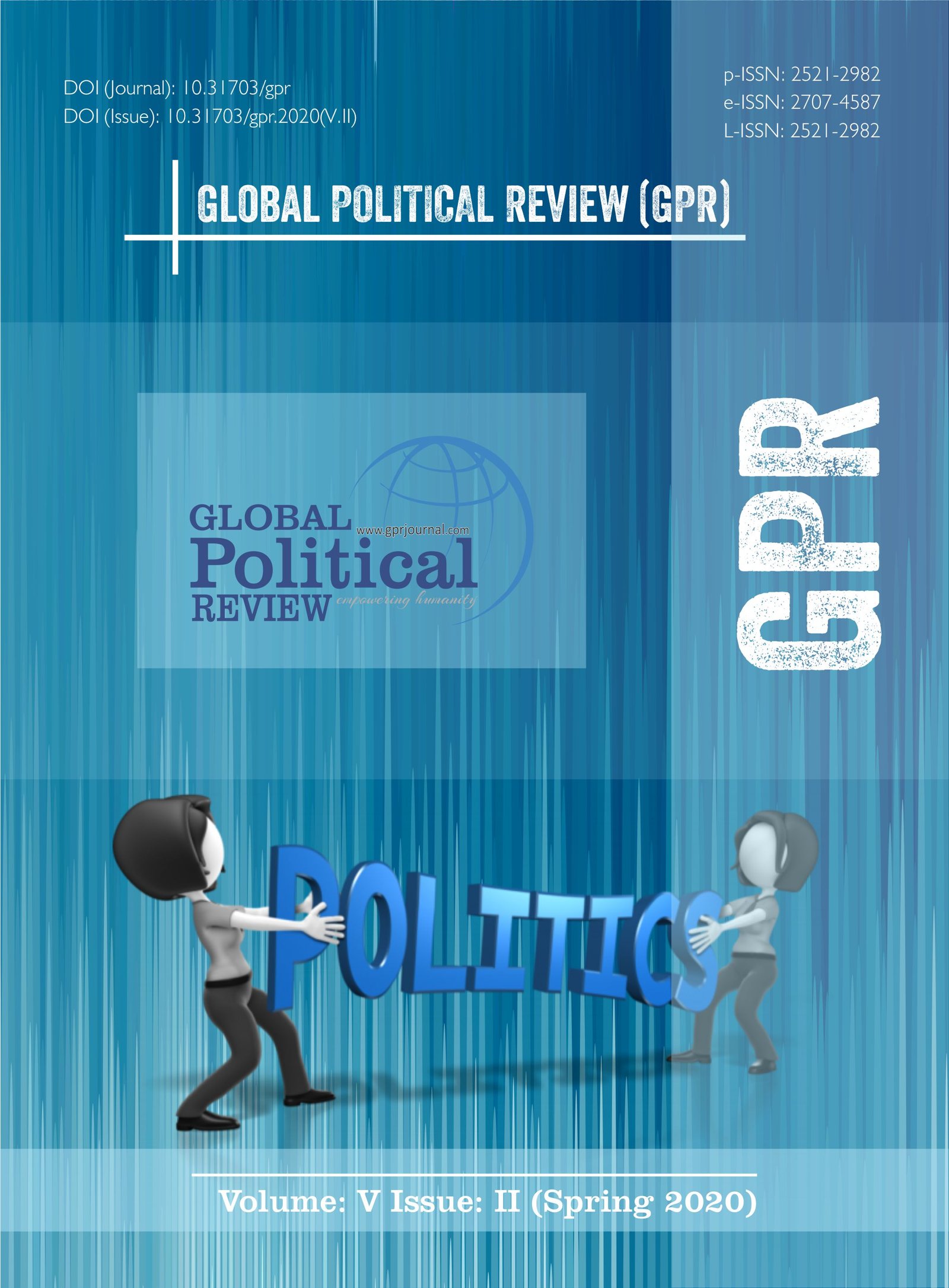 Volume V, Issue II (Spring 2020)
Volume V, Issue II (Spring 2020) 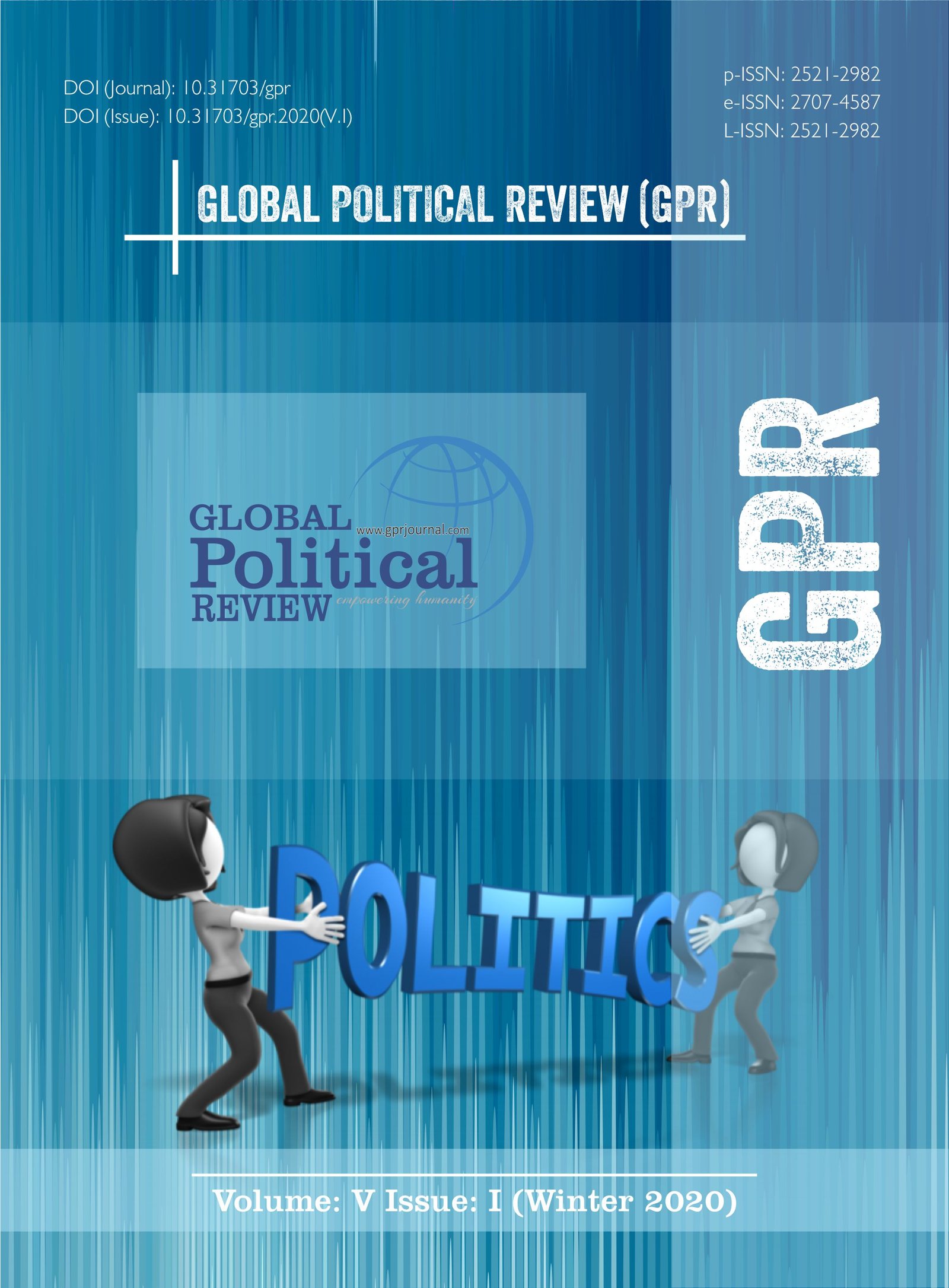 Volume V, Issue I (Winter 2020)
Volume V, Issue I (Winter 2020)  Volume IV, Issue IV (Fall 2019)
Volume IV, Issue IV (Fall 2019)  Volume IV, Issue III (Summer 2019)
Volume IV, Issue III (Summer 2019)  Volume IV, Issue II (Spring 2019)
Volume IV, Issue II (Spring 2019) 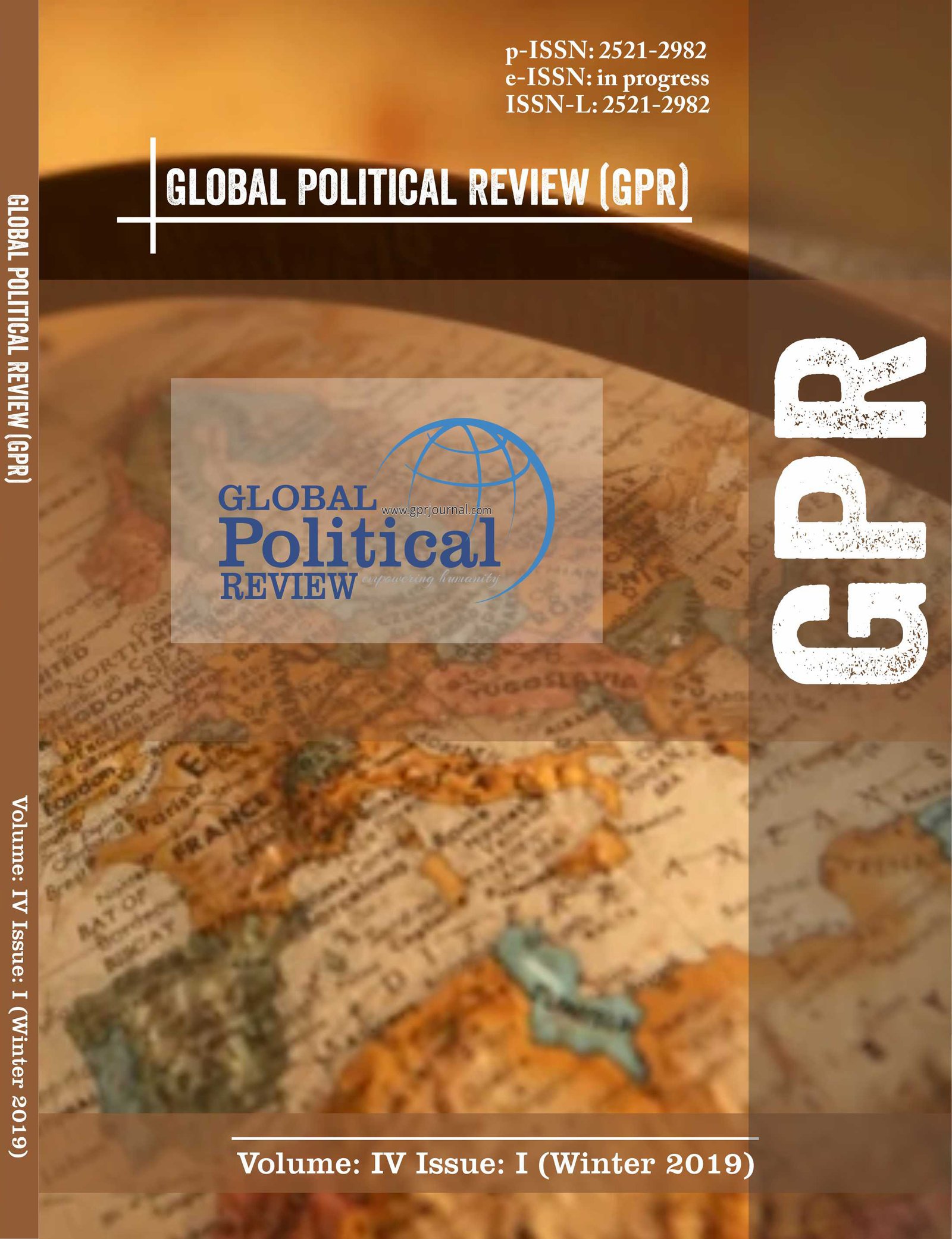 Volume IV, Issue I (Winter 2019)
Volume IV, Issue I (Winter 2019) 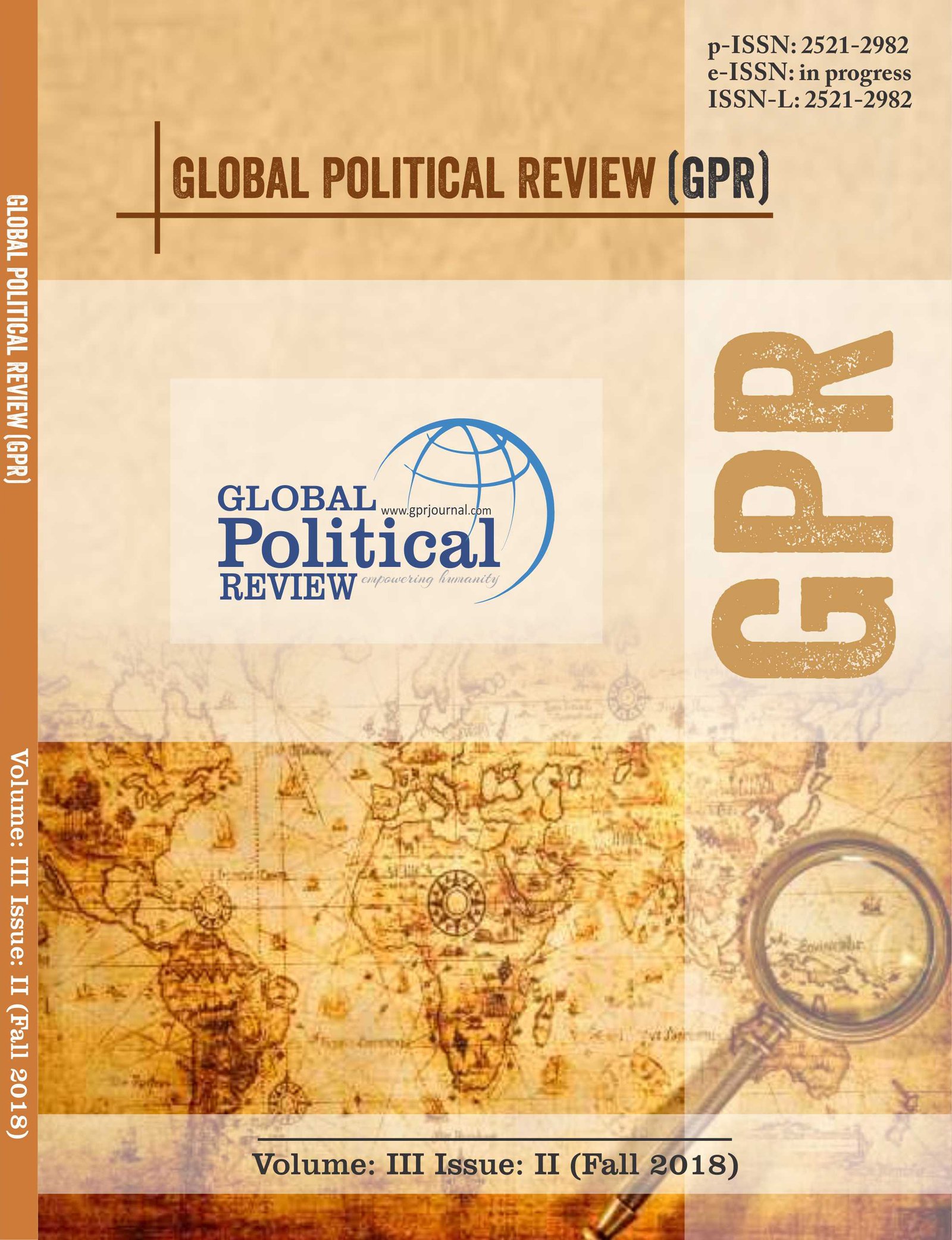 Volume III, Issue II (Fall 2018)
Volume III, Issue II (Fall 2018) 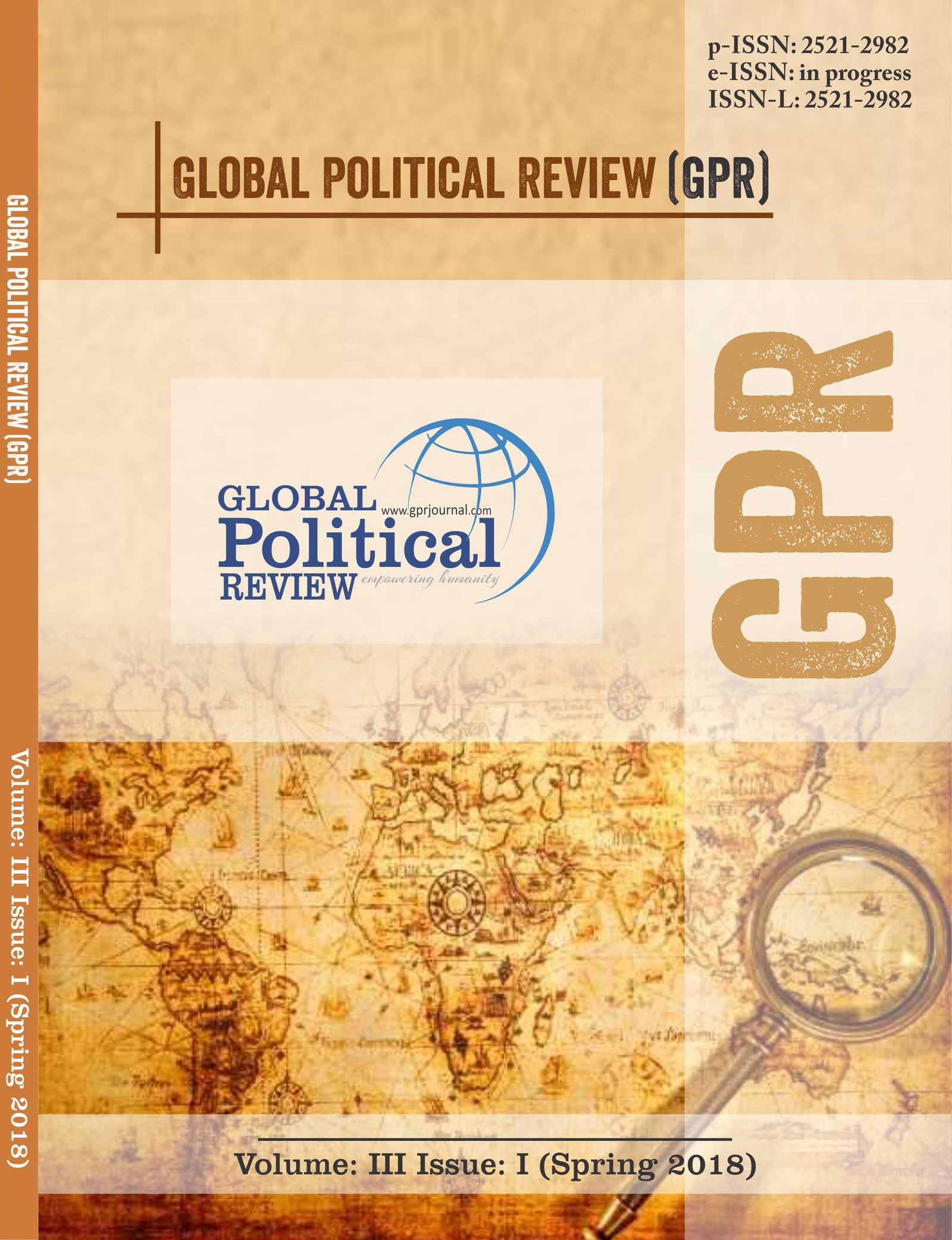 Volume III, Issue I (Spring 2018)
Volume III, Issue I (Spring 2018)  Volume II, Issue I (Fall 2017)
Volume II, Issue I (Fall 2017)  Volume I, Issue I (Fall 2016)
Volume I, Issue I (Fall 2016)